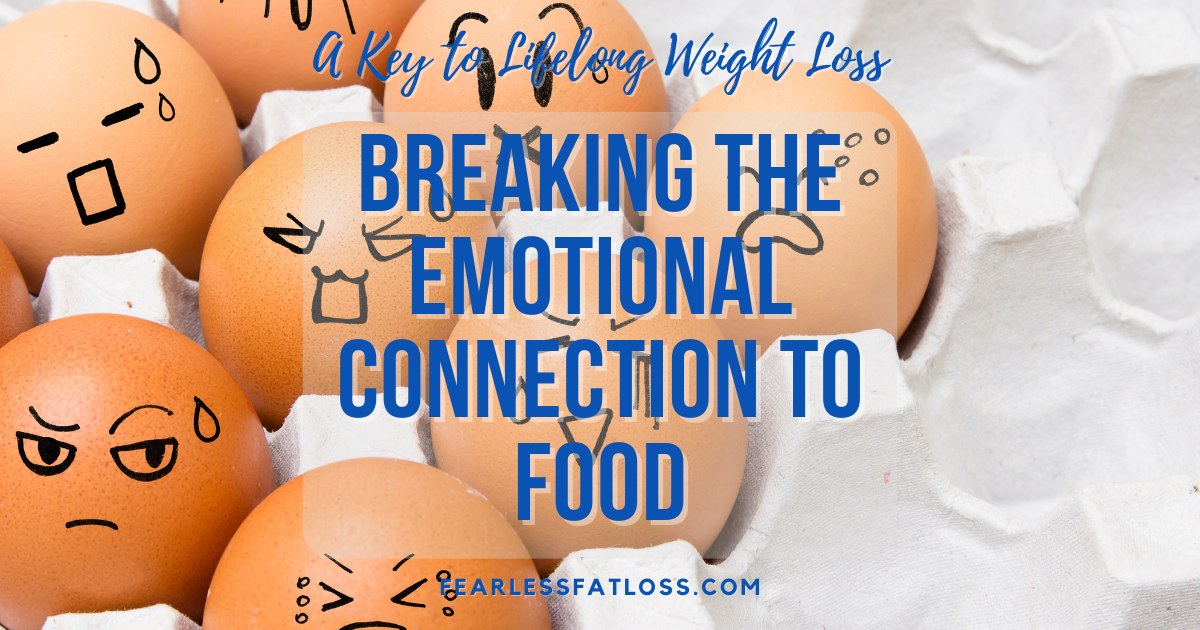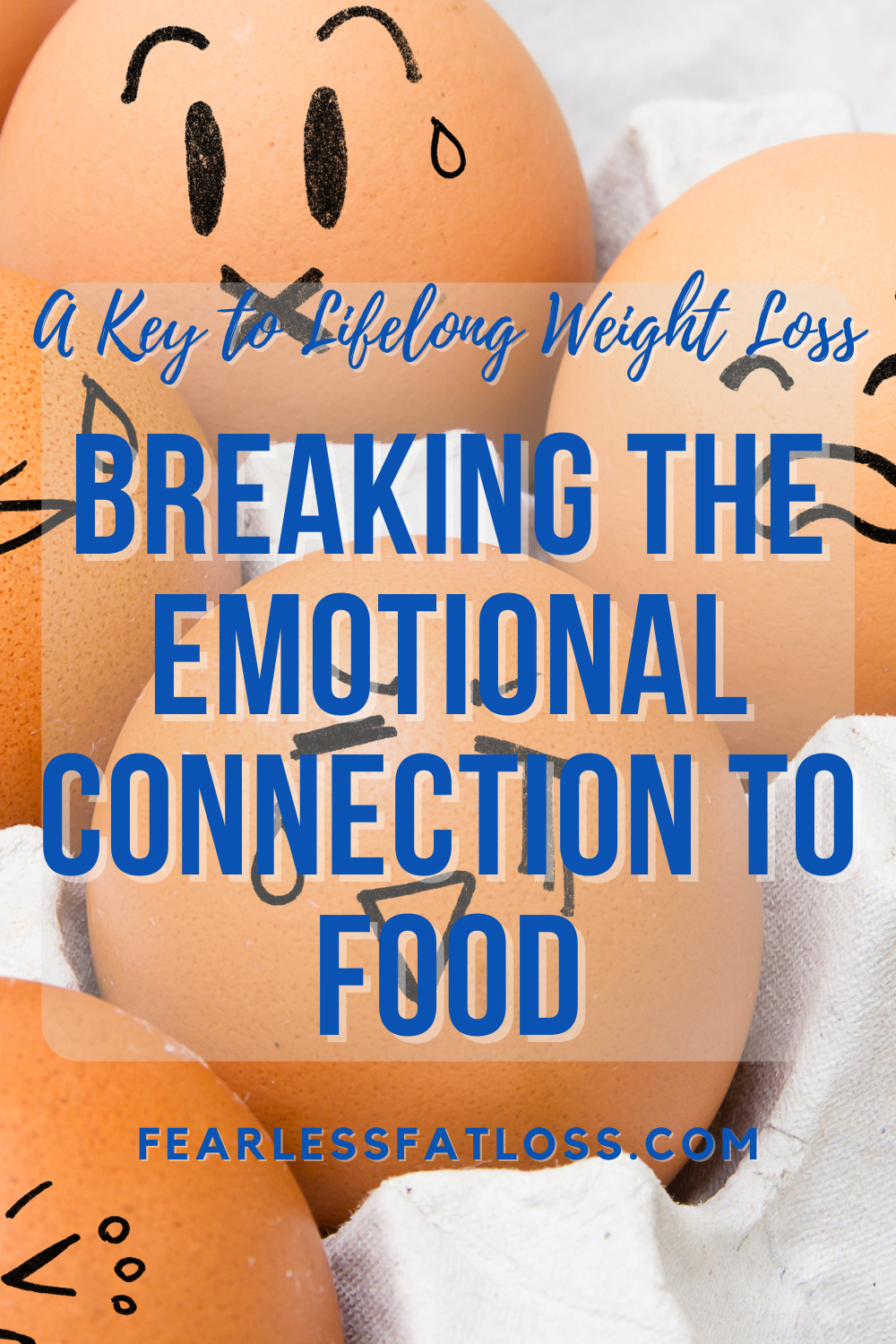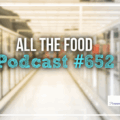Breaking the Emotional Connection to Food: A Key to Lifelong Weight Loss
For many smart, spiritual women who have struggled with weight loss for most of their lives, it’s not just about the food, it’s about the emotions tied to eating. These emotional connections to food can keep us locked in cycles of overeating, bingeing, and the infamous yo-yo dieting that makes long-term weight loss feel like a distant dream.
I totally get it, I’ve been there before too, which I think is a good thing because it makes me a much more powerful coach for my coaching clients. I understand the struggle and I also know what it’s like to be on the other side of it, the other side where weight loss feels like “no big deal” because you’re in total alignment with your weight loss goals.
The truth is, without addressing the emotional roots that drive unhealthy eating habits, permanent weight loss remains elusive. So, if you’ve been searching for a way to finally break free from the chains of lifelong overeating habits, read on. Understanding and healing the emotional connection to food may be the turning point you’ve been seeking.
Why We Form Emotional Connections to Food
For many, the relationship with food begins early. Maybe you were comforted with treats after a tough day at school, rewarded with sweets for good behavior, or even turned to food for solace during stressful times. These patterns become deeply ingrained over time, linking food with comfort, love, reward, and escape.
This emotional connection can turn food into a coping mechanism, something we rely on during stressful or painful times. I remember myself, my mom giving me a Little Debbie oatmeal pie after getting home from school. Either that or a Little Debbie Star Crunch.
My Little Debbie Emotional Connection
Thankfully I’m not emotionally tied to those foods now, I can’t even remember the last time I ate either of them, but writing about it brings back those memories, and if I were to think about it longer, the memories could even lead me to start visualizing them and want them!
I do have tools to deal with this, which I also teach my permanent weight loss coaching clients, but without real results tools to work with the old history of your emotional connection to food, it’s easy to unconsciously stay stuck in the struggle.
Emotional Eating and the Emotional Connection to Food
Unfortunately, these emotional connections to food, food histories, and lifelong eating habits often weave into emotional eating: reaching for snacks when sad, stressed, lonely, or even bored.
Over time, this emotional reliance on food makes it hard to distinguish between real hunger and emotional hunger. In moments of emotional stress, food becomes a quick fix, a temporary balm that soothes but ultimately leaves you feeling unsatisfied. This is why, for many smart women, traditional diet plans fail. They don’t address this deeply rooted emotional connection, making it nearly impossible to maintain long-term weight loss.
How Emotional Eating Sabotages Your Best Weight Loss Efforts
Emotional eating is powerful because it taps into our brain’s reward system. When we eat certain foods, especially high-sugar and high-fat ones, our brains release dopamine, a “feel-good” hormone. This response reinforces our need for food as a source of comfort, creating a cycle that’s hard to break.
Food can literally become an addiction, just like any other addiction, especially when you include the fact that ultra-processed foods are packed with highly addictive ingredients and chemicals that keep you eating more and more and more.
Even if you get off of the highly processed foods though, without addressing the emotional triggers, no diet or exercise plan will fully overcome this reward cycle.
The big problem is that you can make your best effort to lose weight but if you don’t heal your emotional connection to food and get past the emotional eating habit, you can quickly undo any weight loss progress you may have made by sliding back into emotional eating.
How Your Emotional Connection to Food Sabotages Your Weight Loss Goals
There are several ways your emotional connection to food will sabotage your weight loss goals and can even hold you in a pattern of overeating and overweight for years on end. Let’s take a look at a few of them:
Bingeing and Overeating:
Emotional eating can lead to binge eating which is another unhealthy eating behavior most of my weight loss coaching clients have struggled with.
Emotional eating is not necessarily about stuffing yourself with large quantities of food but can easily lead to the behavior of binge eating. Binge eating definitely will sabotage your weight loss goals since you’re consuming large amounts of food in one sitting, beyond what the body needs for nourishment.
Increased Cravings:
Emotional hunger typically craves specific “comfort foods” high in sugar, fat, and salt, leading to further cravings that set up a cycle that can be hard to break free of.
We have to look at the fact that highly processed foods are often extremely addictive since they are loaded with sugar, fat and sodium and give the emotional eater a “boost” and can help them feel better even if only for a few minutes.
The emotional eating payoff of a temporary boost however, creates long term weight loss sabotage since the ultra processed foods do not aid to healthy, successful weight loss.
Self-Criticism and Guilt:
Emotional eating can leave you feeling guilty or ashamed, damaging your self-worth and confidence to make lasting changes. These results can be even more damaging than the extra weight resulting in overweight or obesity.
The dings to your self-esteem, self-worth and confidence in yourself further sabotage your weight loss efforts because if you don’t believe you can lose weight, it will be too easy to give up on the entire thing!
The mainstream dieting industry does not help you with this and it’s most important that you address your inner world in order to heal the shame, embarrassment, guilt and low self-esteem so that you can pick yourself up and get to your goal weight for good.
Cycle of Yo-Yo Dieting:
This emotional cycle makes it hard to stick to a plan, resulting in a pattern of losing and regaining weight that frustrates and demotivates. Endless yo-yo dieting also erodes your belief that you ever can achieve weight loss that lasts.
Without healing the emotional connection to food, lifelong weight loss will feel like a dream you can never have but the truth is you can have it, if you take action to address the real problems that sabotage your weight loss.
The real problems are found in your mindset, right between your own two ears. This is GREAT NEWS because you can change your mindset about weight loss! Change your mindset and you’ll be able to heal your emotional connection to food and break free of yo-yo dieting.
Breaking the Emotional Connection to Food: A Key to Lifelong Weight Loss
To be successful in finally getting thin forever, which means to lose weight, reach your weight loss goal, and maintain your best weight for life, you’ll need to heal your emotional connection to food.
When you create a healthy relationship with food you can manage your weight successfully without using food as a crutch to get through life. Without healing your emotional connection with food it’s going to be a constant struggle to break free of emotional eating, binge eating, compulsive overeating and additional unhealthy eating behaviors.
5 Steps to Break the Emotional Connection to Food
Let’s take a look at 5 steps to break the emotional connection to food. You can start with this now although to be honest, it will be faster and easier to break free with coaching. Mind-body weight loss coaching (with the right coach of course) can provide the accountability and support you dearly need in order to break free.
The following 5 steps are steps you can start with immediately. Consistency and mindfulness will be essential. Don’t be hard on yourself and expect instant results! Change takes time.
1. Understand Your Triggers
Identifying what triggers your emotional eating is the first step to breaking free. Are you more likely to reach for food when you’re stressed, sad, or lonely? Common triggers include relationship issues, work stress, financial worries, and even boredom. Recognizing these triggers can help you start making mindful choices when the impulse to eat for comfort strikes.
2. Differentiate Between Physical and Emotional Hunger
Learning to distinguish between real hunger (meaning physical hunger) and emotional hunger is crucial. Physical hunger comes on gradually and can be satisfied with a range of foods, while emotional hunger feels urgent and craves specific comfort foods. Before reaching for food, pause and ask yourself if you’re truly physically hungry. If you’re not sure, try drinking a glass of water or waiting a few minutes—physical hunger will persist, while emotional hunger often fades.
3. Find Non-Food Ways to Cope with Emotions
Breaking the emotional connection to food involves finding alternative coping strategies. Think of activities that bring comfort and relaxation, such as journaling, taking a walk, calling a friend, or practicing mindfulness exercises. Over time, these new habits can provide the comfort you once sought from food, helping you manage stress and difficult emotions without overeating.
4. Practice Mindful Eating
Mindful eating is a powerful tool for overcoming emotional eating. When you eat mindfully, you pay attention to your food, savor each bite, and tune in to your body’s hunger and fullness cues. This process not only helps prevent overeating but also allows you to enjoy food without guilt or distraction. Mindful eating helps build a healthier, more satisfying relationship with food, making it less likely you’ll turn to it for emotional comfort.
5. Seek Support and Accountability
Overcoming emotional eating is not easy, and it often requires a supportive environment. Whether it’s a trusted friend, a therapist, or a weight loss coach, having someone to talk to can make a big difference. Many women find support groups or coaching programs invaluable, as they provide accountability and a safe space to share struggles, learn coping techniques, and celebrate victories.
Keep in mind that coaching is all about getting results, rather than talking about feelings and not focusing and getting real results in your day-to-day life. While therapy is great if you are looking to talk, I’ve had too many weight loss coaching clients who have told me that they never got the tools from therapy like they got from me in my proven step-by-step coaching system. It all depends on what you really want though.
Why Addressing Your Emotional Connection to Food is Key to Lasting Change
If you’ve struggled with weight loss and emotional eating for years, you know that quick fixes don’t work. Traditional dieting alone isn’t enough because it ignores the psychological and emotional layers tied to food. Addressing the emotional aspects of eating allows you to heal and change your habits from within, laying the foundation for sustainable weight loss. When you understand and begin to heal your relationship with food, you no longer need to rely on it as a crutch for emotional support.
By breaking the emotional connection to food, you’re empowered to create lasting change, where eating becomes a way to nourish your body, not your emotions. This shift in mindset can help you overcome binge eating, compulsive snacking, and other harmful eating behaviors that have held you back. It’s a journey that takes patience, but with each step, you move closer to a healthier, more fulfilling life.
Lasting Weight Loss Is About More Than Dieting
Achieving lasting weight loss success requires more than a diet; it requires a shift in the way you view food and and how you manage your emotions.
Well, to be clear, losing weight for good requires more than a food diet; it DOES Require a Diet for your brain! A mindset diet, to be specific.
You see, mindset is 92.8% of what determines how successful (or unsuccessful) you will be with your dream of ultimate weight loss: to lose weight and keep it off.
By understanding and addressing the emotional connection to food, you can build a healthier relationship with food, free from the cycle of guilt, shame, and restriction. Working within your inner self to shift your mindset about weight loss allows you to transform not just your eating habits but also your overall well-being.
Remember, lasting weight loss is a journey that starts within. When you heal your emotional connection with food, you create the path to sustainable weight loss and a healthier, more joyful life.
Who Else is Ready to Break Free?!
Addressing the emotional connection to food is the missing piece in most weight loss plans. By focusing on this core issue, you can finally break free from the cycles that have kept you from reaching your goals and step into a healthier, more empowered life.
If you’re ready to finally break free and you know you need help to do it, then I invite you to apply for a complimentary weight loss discovery session with me now!
This is only for you if you are seriously committed to breaking free of your emotional connection with food so that you can finally lose weight for good. Once you break free of emotional eating, binge eating, compulsive overeating and mindless eating, doesn’t it make sense that you’ll finally be able to lose weight and do it struggle-free?
Click here to take your first step towards freedom from the struggle (yay!).





